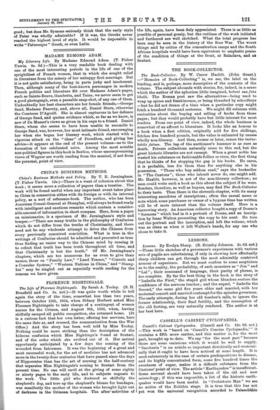The Life of Florence Nightingale. By Sarah A. Tooley. (S.
H. Bousfield and Co. 5s. not.)—It was quite worth while to tell again the story of the time, somewhat less than two years, between October 15th, 1854, when Sidney Herbert asked Miss Florence Nightingale to take charge of a contingent of women nurses for the Crimea, and August 8th, 1856, when, having skilfully escaped all public recognition, she returned home. (It is a curious fact that her own letter, offering her services, bore the same date as, and crossed, the communication from the War Office.) And the story has been well told by Miss Tooley. Nothing could be more striking than the description of the hideous confusion which Miss Nightingale found at Scutari, and of the order which she evolved out of it. Her arrival opportunely anticipated by a few days the coming of the wounded from Inkerman. It was the beginning of a great and most successful work, for the art of medicine has not advanced more in the twenty-four centuries that have passed since the days of Hippocrates than has the art of nursing in the half-century that separates Miss Nightingale's coming to Scutari from the present time. No one will cavil at the giving of some eighty or ninety pages to the early life, and to subjects cognate to the work. The little girl who doctored so skilfully the shepherd's dog, and tore up the shepherd's blouse for bandages, was manifestly the mother of the woman who brought light out of darkness in the Crimean hospitals. The after-activities of the life, again, have been duly appreciated. There is as little as possible of personal gossip, but the outlines of the work initiated and furthered are well sketched. What the total progress has been may be seen in the history of the Boer War. The worst things said by critics of the concentration camps and the South African hospitals would have been equivalent to emphatic praise of the condition of things at the front, at Balaclava, and at Scutari.






















































 Previous page
Previous page